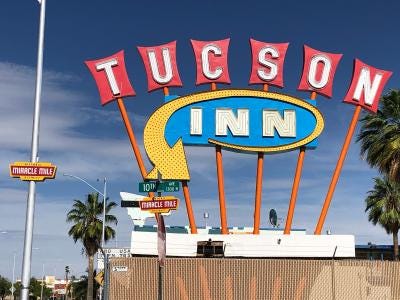🏛️ Historic Motel Demolition Sparks Heated Debate
PCC's decision ignites preservation lawsuit amid board transition
Based on the 12/10/24 Buckmaster Show on KVOI-1030AM.
🙊 Notable quotes from the show
😽 Keepin’ It Simple Summary for Younger Readers
👧🏾✊🏾👦🏾
🗝️ Takeaways
🔹 Arizona's economy shows resilience with 1.6% inflation and strong wage growth
🔹 CAP faces skilled worker shortage despite infrastructure expansion needs
🔹 PCC's motel demolition of condemned motel outrages white liberals against the only minority school board members
🔹 Colorado River negotiations face a critical impasse
🔹 Housing market remains stalled by high interest rates
📻 What They Discussed
The Buckmaster Show, broadcast on Tuesday, December 10, 2024, featured an impressive lineup of experts discussing Arizona's economic landscape, water resources, and historic preservation. Host Bill Buckmaster welcomed:
Dr. Dennis Hoffman, Director of ASU's L. William Seidman Research Institute,
Shelly Fishman, a seasoned financial consultant,
Karen Cesare, Pima County's representative on the Central Arizona Water Conservation District Board, and
Ken Scoville, a local historian and preservation advocate.
📈 Arizona's Economic Outlook: Hope Amid Housing Headwinds
Dr. Hoffman painted an optimistic picture of Arizona's economy, highlighting strong employment growth at 2% and impressive wage growth exceeding 4%. "It's been a great year for Arizona," he noted, pointing to moderating inflation at 1.6% CPI.
Despite challenges in housing affordability due to high interest rates, the state's economic resilience shines through, particularly in the West Valley's semiconductor manufacturing boom.
However, Hoffman acknowledged a demographic shift: "We don't get that flow of people in the way we used to," reflecting on slower population growth compared to previous decades.
Looking ahead to 2025, he projected positive revenue forecasts, though noting inequality concerns: "It's not great for everybody, but for the average and majority, it is great."
💰 Financial Markets and Policy Concerns
Financial consultant Shelly Fishman offered a critical analysis of potential economic policies, particularly regarding Trump's proposed tariffs. "The general consensus among economists is that if he were to impose the tariffs across the board...that would cause tremendous pain from an inflation perspective on those people who can least afford it."
Fishman also discussed Medicare enrollment changes and addressed concerns about guaranteed issue life insurance policies, warning they are "absolutely fundamentally the most expensive policies you can buy."
His market outlook remained cautiously optimistic, though he emphasized potential headwinds from policy changes.
💧 Water Rights and Infrastructure Challenges
Karen Cesare brought urgent updates from the Colorado River Water Users Association conference, revealing disappointment with the Bureau of Reclamation's preferred alternatives.
The CAP Board's emergency resolution emphasized two critical points: evaluating compact compliance impacts and advancing the lower basin alternative for full analysis. "Everybody's got to share some of the pain," Cesare stressed, highlighting the importance of collaborative solutions over litigation.
She also addressed CAP's workforce challenges, noting that two-thirds of their 500 employees work in operations, maintenance, and engineering, with a growing need for skilled trades workers.
🏛️ Historic Preservation Battle vs. Fiscal Reality
The controversy over Pima Community College's decision to demolish three historic Miracle Mile motels reveals a deeper conflict between preservation nostalgia and practical fiscal responsibility.
While historian Ken Scoville emphasized the architectural significance of the Tucson Inn's neon sign designed by Anne Riesdale, "the only female registered architect in Tucson in the 1950s," he glossed over the fact that the Tucson Inn had already been condemned.
This raises serious questions about why preservation advocates allowed such "historically significant" properties to deteriorate to the point of condemnation in the first place.
The political battle centers around two outgoing board members who voted for demolition before their terms ended. While Scoville frames this as "revenge," stating, "They made the decision just before Thanksgiving to demolish the building, and it's a final Christmas present for those of us in the preservation community," he fails to address why a public community college, already facing budget constraints, should bear the financial burden of rehabilitating dilapidated motels.
Despite the unanimous vote, the two outgoing board members whom Ken Scoville specifically targeted are also the only minority board members: a Chicano widow and a Pascua Yaqui tribal member. Why, Ken?
The preservation lawsuit and cease-and-desist order appear to prioritize maintaining deteriorating structures over the college's core educational mission and financial stability. They seem to be based more on romanticized memories of bright neon signs than on current community needs and fiscal realities.
When Buckmaster specifically asked about condemnation, Scoville admitted the Tucson Inn was condemned, attempting to minimize the Tucson Inn's deteriorated state while emphasizing how the other motels "probably scraped by pretty well and especially during the Gem and Mineral show when everything fills up and everybody makes some money." This tepid defense of the properties' viability underscores the gap between preservation idealism and practical reality.
PCC is a community college, not in the hotel management business. Students first.
🦉 Three Sonorans Commentary
🏙️ Beyond Neon Signs: Examining Selective Preservation and White Liberal Racism in Tucson
😽 Keepin’ It Simple Summary for Younger Readers








